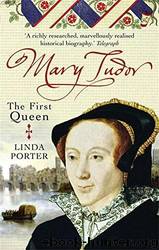Mary Tudor by Linda Porter

Author:Linda Porter
Language: eng
Format: mobi, epub
Publisher: Hachette Digital
Published: 2010-02-08T22:00:00+00:00
The picture of Mary as a woman who had little grasp of what was going on, who could not work with her politicians and was essentially run by her cousin, Charles V, is entirely false. From the very beginning, the queen had a clear idea of what she wanted to do and the utter determination to achieve it. She never, even when unwell, shrank from the business of government, and she knew that she must draw on the experience of the men who had tried to deprive her of her throne. Without their expertise, and their very real sense of duty to the Crown, nothing could function, and Mary recognised this from the outset. She did not like them and it is fair to say they probably did not like her, but their need was mutual. Her strong voice and personality, coupled with a notable temper at times, meant that she was no pushover, to be manipulated as they saw fit. On one occasion, she reduced William Paget to tears, something that her father never did. She was naturally outspoken and found it hard to hide her feelings. As queen, she was not obliged to curb her tongue lest she be hectored as she had been by her brother’s privy council.
The most pressing priority for Mary was to re-establish the structure of orderly government. Uncertainty over the succession had distracted from the smooth running of affairs, and it was time to address the many issues of day-to-day administration, as well as putting down markers on key policies. On the day Mary was proclaimed, William Cecil, a councillor who she believed bore her little goodwill, set off to meet her at Ipswich, armed with a list of areas for early resolution. Whatever they thought of each other, the past could not be allowed to intrude into the demands of the present. Cecil had a veritable shopping list of matters of state, ranging from the burial of Edward VI (which had not yet taken place) to foreign policy, the economy, the restitution of law, the calling of Parliament and the coronation. There was, interestingly, no specific mention of religion. At the top of his agenda was the need to establish a council. He could have served on it if he had wished, but he declined the offer when it was made and returned to private life. His Protestantism was not of the strident kind, but it was deeply held, and he knew he would be uncomfortable working with Mary.
At the time of her proclamation, Mary had 21 councillors with her in East Anglia. They were her household officers and the leading local men who answered her summons for assistance. None of them had any experience of national government, and though they had been successful in putting Mary on the throne, they were not necessarily well qualified to run the country. Uncomfortable as it might be, only an injection of Edwardian councillors could supply the continuity that the government must have if it was to function effectively and without challenge.
Download
This site does not store any files on its server. We only index and link to content provided by other sites. Please contact the content providers to delete copyright contents if any and email us, we'll remove relevant links or contents immediately.
| Africa | Americas |
| Arctic & Antarctica | Asia |
| Australia & Oceania | Europe |
| Middle East | Russia |
| United States | World |
| Ancient Civilizations | Military |
| Historical Study & Educational Resources |
Cecilia; Or, Memoirs of an Heiress — Volume 1 by Fanny Burney(32538)
Cecilia; Or, Memoirs of an Heiress — Volume 2 by Fanny Burney(31934)
Cecilia; Or, Memoirs of an Heiress — Volume 3 by Fanny Burney(31925)
The Secret History by Donna Tartt(19025)
Sapiens: A Brief History of Humankind by Yuval Noah Harari(14358)
Leonardo da Vinci by Walter Isaacson(13305)
The Radium Girls by Kate Moore(12012)
Sapiens by Yuval Noah Harari(5363)
How Democracies Die by Steven Levitsky & Daniel Ziblatt(5210)
The Wind in My Hair by Masih Alinejad(5085)
Homo Deus: A Brief History of Tomorrow by Yuval Noah Harari(4897)
Endurance: Shackleton's Incredible Voyage by Alfred Lansing(4749)
Man's Search for Meaning by Viktor Frankl(4569)
The Silk Roads by Peter Frankopan(4522)
Millionaire: The Philanderer, Gambler, and Duelist Who Invented Modern Finance by Janet Gleeson(4457)
The Rape of Nanking by Iris Chang(4194)
Joan of Arc by Mary Gordon(4092)
The Motorcycle Diaries by Ernesto Che Guevara(4082)
Stalin by Stephen Kotkin(3955)
